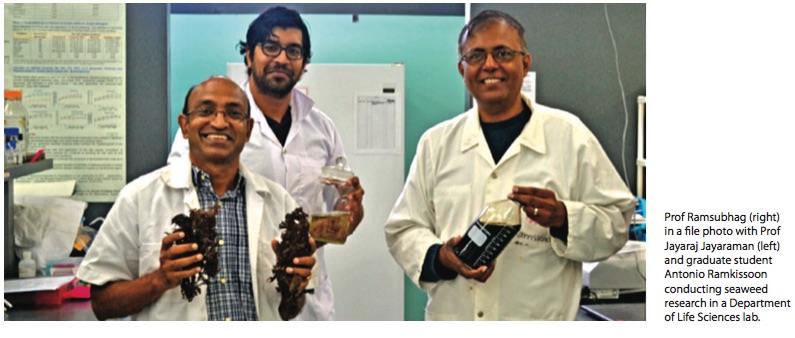
We live in a microbial world. So says Professor Adesh Ramsubhag, newly inaugurated Professor of Microbiology and Biotechnology at The University of the West Indies, St Augustine campus.
We can't see its microscopic inhabitants, but they're a population of millions of trillions and they're all around us – on every surface and in our every breath. In fact, there are more microbes on a speck of dirt than there are human beings on earth, and here in the Caribbean, that number increases vastly. Size never being a good indicator of worth, however, these microscopic creatures are fundamental to the survival of all life on our planet, and offer serious potential for our local and regional health and wellness, and agriculture industries.
On April 12, 2023, Professor Ramsubhag took the stage at UWI’s Daaga Auditorium to educate an engaged audience on our region’s unique microbial world at his Professorial Inaugural Lecture, “Journey through the local microbial landscape: Challenges and biotechnological potential for the Caribbean”.
It’s a route he knows intimately, having trod, waded and dug his way through our region’s natural environment to make the discoveries and breakthroughs that led him to this moment. A self-proclaimed unwilling-student for much of his pre-tertiary education, Professor Ramsubhag joined UWI as a student of the N1 programme, fell in love with science, and stayed because of it, conducting research, developing powerful biotechnological innovations, and producing results that have deep impact for the future of the Caribbean. He did this all together with his students.
Along the way, he served as Deputy Dean of Graduate Studies and Research from 2012 to 2015, and Head of the Department of Life Sciences at the Faculty of Science and Technology from 2015 to 2018. A man of many accomplishments, his ascension to the rank of professor followed his 2018 Anthony N Sabga Award for Caribbean Excellence in Science and Technology, and his 2019 Vice Chancellor’s Award for Excellence in Research. Prof Ramsubhag is now set to make a substantial contribution to several of the UN Sustainable Development Goals through his research on the Caribbean’s microbiomes.
In his lecture, Professor Ramsubhag explained that microbes have significant impact on our health – for humans, animals and plants alike, as well as our environment.
“We depend on certain microbial compositions to maintain our good health,” he said.
The microbiome of our skin, for example, helps to protect us from harmful environmental conditions. Those of plants protect them from disease, and are essential to their nutrition and to soil fertility. Microbes also clean our environment by degrading toxic substances, and are a vital component of most antibiotic medication, and a source of food – think the mushrooms that pepper our pizza and pasta dishes, as well as the chemical reactions that leaven our bread and brew our favourite libations.
“These are very, very critical organisms,” particularly within the Caribbean, Professor Ramsubhag asserted. Ours is a unique environment, rich in microbial biodiversity.
He explained that having been in existence for approximately four billion years, microbes have had a long time to evolve. The result has been a level of diversification he describes as “mind-boggling”. Look again at that speck of dirt and you could find 10 billion individual microbes and 50,000 microbial species. Subject it to the warmth and moisture of our tropical climate and the numbers increase ten-fold.
That, in fact, was one of Professor Ramsubhag's research projects.
“We explored the diversity of microbes in different types of ecosystems,” he shared, revealing that some of his team's samples showed hundreds of thousands of microbial species in just one sample – an occurrence found nowhere else in the world.

What that means, he said, is that “we have tremendous potential”. Using a warfare analogy, he explained microbes' natural synthesis of antibiotics to protect themselves from one another – “one will produce an antibiotic and the other will produce a chemical to counter [it]” – and reflected on how “this type of environment is a driver for novel antibiotic [and] bioactive compounds”, like new drug molecules and antibiotics.
There's a “trade-off” however, he said, as “you also get new antibiotic resistance... and they cause more serious disease”. Professor Ramsubhag’s current research in this area looks at both aspects, “[t]he good and the bad and the ugly,” and he divides his work into two broad categories – the first: detection and characterisation of harmful organisms; and the second: biotechnical applications, through which he seeks to learn, “How can we generate beneficial products or processes, and utilise [them] to solve problems in society?”
Through his research, always in collaboration with his students, fellow UWI lecturers, and external researchers, Professor Ramsubhag and his team produced work whose results showed serious implications, and produced viable applications.
Among the implications is this: our heavily polluted fresh and marine water bodies, soil and air, as well as antibiotic and copper resistance, means that our crops are susceptible to disease, and so are we. However, Professor Ramsubhag and his respective teams were also able to produce solutions that have already borne incredible results, including using different combinations of bacteria to degrade contaminants in our soils; converting the Sargassum that blankets our shores into plant supplements to enhance crop growth; developing environmentally friendly and faster-working alternatives to pesticides and fungicides; and developing probiotics that have been shown to protect against some diseases.
Having met this major milestone, Prof Ramsubhag has now turned to the UN Sustainable Development Goals, and if his results are proof of anything, we should be well set to meet them.